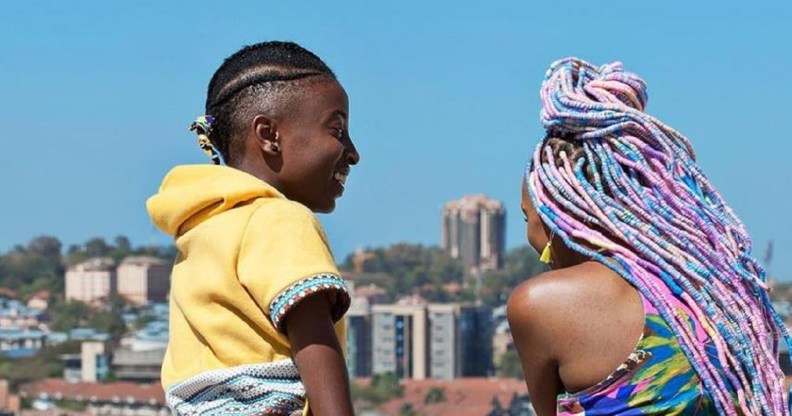Banned film Rafiki claims acting award at African film festival

The two main characters in Rafiki, Kena and Ziki (Rafiki)
The star of lesbian love story Rafiki, Samantha Mugatsia, has won the best actress award at Africa’s largest film festival, despite the film being banned in Kenya.
The actress picked up the honour at FESPACO (Pan-African Film and Television Festival of Ouagadougou) in Burkina Faso on Saturday (March 2), according to BBC News.
Rafiki was banned last year by the state-run Kenya Film Classification Board (KFCB) because of its “homosexual theme and clear intent to promote lesbianism.” Gay sex is illegal in Kenya.
Rafiki director Wanuri Kahiu: ‘Queerness cannot be silenced’
In reaction to the win, director Wanuri Kahiu tweeted: “So happy, overwhelmed, in tears! @rafikimovie WON best actress at FESPACO.
“The oldest African film festival acknowledged a queer character and awarded @S_Mugatsia for her depiction! Well done @S_Mugatsia!!! So proud! So proud! Queerness cannot be silenced!”
She added: “Winning Best Actress for RAFIKI at FESPACO is monumental. It is not only a recognition of Kenya’s artistry and adds Kenya to the history of African cinema, but a huge recognition of Freedom of Expression within Africa.
“Winning Best Actress for RAFIKI at FESPACO is monumental. It is not only a recognition of Kenya’s artistry and adds Kenya to the history of African cinema, but a huge recognition of Freedom of Expression within Africa.”
– Wanuri Kahiu
“We have the RIGHT to tell our stories, because they are precisely that — OURS. We have the RIGHT to have all voices heard because they are OURS.
“We have the RIGHT to create, because that’s how we share our humanity with the rest of the world.”
Last year, Rafiki won the audience and jury awards for Best Narrative Feature at the TWIST: Seattle Queer Film Festival, and also took the Silver Hugo award at the Chicago International Film Festival.

Wanuri Kahiu attends the UK Premiere of Rafiki (Jeff Spicer/Getty for BFI)
When Kenya’s government lifted its ban on the film for one week to make Rafiki eligible for Oscars consideration, it shattered box office records in the country.
Rafiki director vowed to fight for film’s release
Speaking at an event in London in October, Rafiki director Wanuri Kahiu said she would continue to fight for her film to get a proper release.
She explained that they had to go to court to get the ban lifted temporarily so that Rafiki could be considered for the Academy Awards.
“The judge made it super clear, she said, ‘I don’t think Kenyans will have an issue with this film.’
“The laws that ban the film are colonial laws, and we are asking for the laws to be updated so that they reflect the constitution that we have. There’s nothing in the constitution that says we can’t make films like this.”
– Wanuri Kahiu
“There’s this new East African word called ‘gayism,’ and the conversation was about that, how this film is promoting and spreading ‘gayism.’ The judge said, ‘No, you don’t catch it,’ and lifted the ban.”
She added: “We’re going back into court to continue to fight for the larger freedom of expression case [to secure a permanent release].
“We have a really young constitution but our constitution hasn’t been tested yet. Freedom [of] expression is one bit.
“The laws that ban the film are colonial laws, and we are asking for the laws to be updated so that they reflect the constitution that we have. There’s nothing in the constitution that says we can’t make films like this.
“I never considered myself an activist… but my work became work that you needed to advocate for. I was pushed into a space where I had to advocate for the work I was creating.”
The director also revealed on Twitter that she will be heading to the High Court in Kenya to argue for ban to be lifted on Rafiki in early April.
LGBT+ rights in Kenya
Last month, Kenya’s High Court delayed its ruling to decriminalise gay sex in the country.
The High Court had been scheduled to issue its verdict on whether to repeal Sections 162 (a) and (c), 163 and 165 of Kenya’s colonial-era penal code on February 22.
These parts of Kenya’s penal code—introduced by the British Empire in 1930—criminalise sodomy.
They also make sexual acts “against the order of nature,” interpreted as including same-sex sexual relations, punishable by 14 years’ imprisonment.
A new hearing date has been set for May 24.

